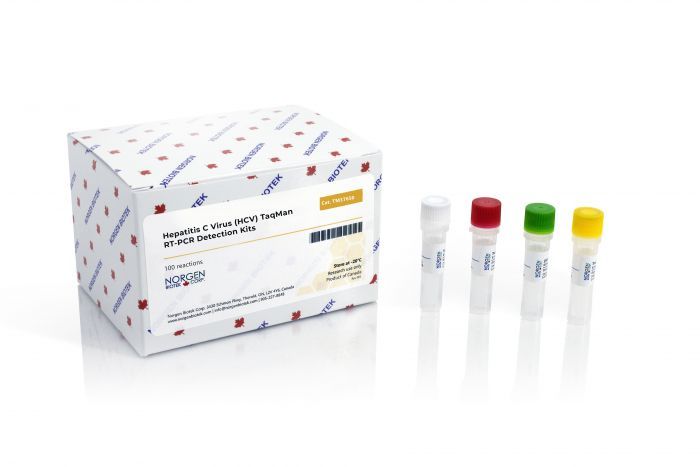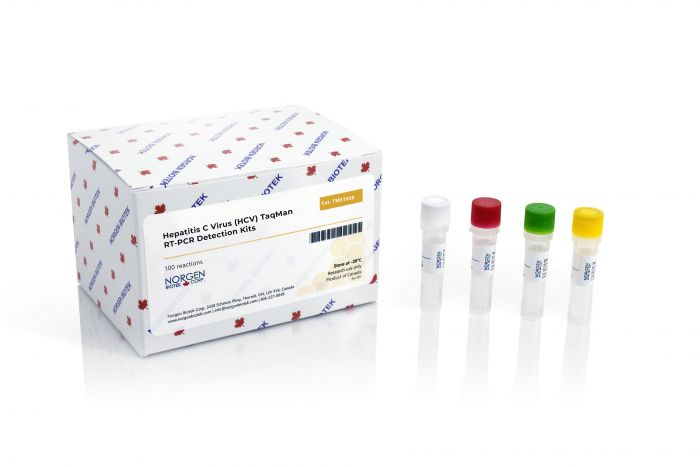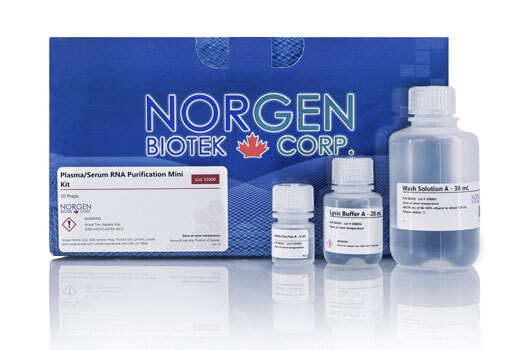Hepatitis C Virus (HCV) TaqMan RT-PCR Detection Kits

For research use only and NOT intended for in vitro diagnostics.
Hepatitis C Virus (HCV) TaqMan RT-PCR Detection Kits
Register today to receive an exclusive 15% off* on your first order.
Features and Benefits
- Detection kits for HCV
- Available in TaqMan format for analysis
Hepatitis C virus infection is a major cause of chronic hepatitis, liver cirrhosis, and hepatocellular carcinoma (HCC) worldwide. Neither a vaccine nor an effective treatment is available for HCV. Pegylated interferon-α (PEG-IFN- α), combined with ribavirin, is the current standard therapy. Its efficiency ranges between 20-80%, depending on the HCV genotype. Unfortunately, many HCV infected patients do not respond to or do not tolerate the IFN-based therapy. Therefore, the number of patients progressing to HCC, as a result of HCV infection, is expected to increase over the next 20-30 years. The natural history of the disease reveals the elusive nature of the virus in a number of features. First, the infection is often detected incidentally at the time of blood donation as the acute infection is clinically asymptomatic in most patients. Second, HCV successfully escapes multi-specific host immune responses in the majority of patients which establishes persistent infection. Third, a significant number of persistently infected individuals remain unaware of the infection for decades, until liver fibrosis, cirrhosis and/or hepatocellular carcinoma develop.
Click to expand options
- Ready to use format, including Master Mix for the target and PCR control to monitor for PCR inhibition and validate the quality
- Specific Primer and Probe mix for the pathogen/virus/viroid of interest
- Primer and Probe mix
- Positive and negative control to confirm the integrity of the kit reagents
- Specific Primer/Probe mix and Positive Control for the pathogen/virus/viroid of interest
- Nuclease-free water
- Can be used together with Norgen’s RT-PCR Master Mix (#28113) or customer supplied master mix
For research use only and NOT intended for in vitro diagnostics.
Details
Supporting Data
TaqMan PCR Kit - Figure 1. Example of TaqMan One-step RT-PCR Positive result. Both PCR signals above the baseline from FAM and HEX channel indicate the successful PCR.
TaqMan PCR Kit - Figure 2. Example of TaqMan One-step RT-PCR Negative result. No target RNA was detected in FAM channel but amplification signal from HEX indicates the successful PCR.
TaqMan PCR Kit - Figure 3. Example of TaqMan one-step RT-PCR inhibition result. No signal from both FAM and HEX channel was detected. It is suggested to repeat the sample preparation using recommended kit for RNA purification.
Storage Conditions and Product Stability
All kit components can be stored for 1 year after the date of production without showing any reduction in performance.
All kit components should be stored at -20°C upon arrival. Repeated thawing and freezing (> 2 x) of the Master Mix and Positive Control should be avoided, as this may affect the performance of the assay. If the reagents are to be used only intermittently, they should be frozen in aliquots.
| Component | Cat. TM37650 (100 preps) | Cat. TM37610 (100 preps) |
|---|---|---|
| MDx TaqMan 2X PCR Master Mix | 2 x 700 μL | - |
| HCV Primer & Probe Mix | 280 μL | 280 μL |
| HCV Positive Control | 150 μL | 150 μL |
| Nuclease-Free Water (Negative Control) | 1.25 mL | 1.25 mL |
| Product Insert | 1 | 1 |


